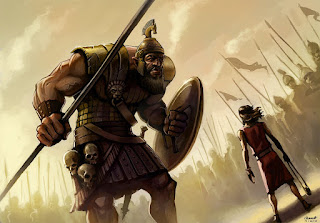More evidence for the Historical Truth of David and Goliath

Even people unschooled in the Bible know the basics of the story of David and Goliath – if for no other reason then the analogy is used whenever something small takes on something large and powerful. Just to prepare to write this blog, I searched for “David and Goliath” on Google News and found stories about residents in a small town in Ireland fighting a large developer , a battle between McDonald’s and a small Irish food chain over the trademark to Big Mac , and the violent stoush resulting when a large galaxy and a small galaxy get too close to each other among other stories. Yes, the story of the future King David, while still too young to join his brothers in a fight for the new kingdom of Israel, against the biggest, baddest Philistine of the time is well-known even to those who have a stunted education of the Bible. Of course, many will say, the story is nonsense. A 9 foot-tall giant being defeated by a young boy and his sling? There couldn’t be anything to it, right? ...
